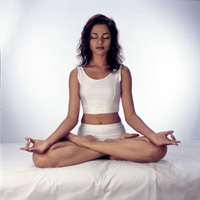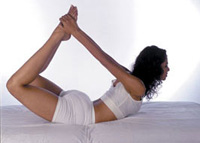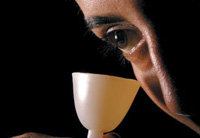
Yoga
 The root for the word Yoga comes from the Sanskrit word `Yuj' which means the Union. Here it means the Union of the Mind, Body and Spirit, also the Union of Oneself with the Universal Self. This holistic science emphasises that this Union is necessary for a person seeking good health and well-being. Sage Patanjali is considered as the Father of Yoga. He formulated the Astanga Yoga - the Yoga with 8 paths which is widely practised today.
The root for the word Yoga comes from the Sanskrit word `Yuj' which means the Union. Here it means the Union of the Mind, Body and Spirit, also the Union of Oneself with the Universal Self. This holistic science emphasises that this Union is necessary for a person seeking good health and well-being. Sage Patanjali is considered as the Father of Yoga. He formulated the Astanga Yoga - the Yoga with 8 paths which is widely practised today.
Yoga is particularly of importance in today's life to prevent and cure diseases - the so-called psychosomatic diseases - the cause of which is mainly from the mind. In today's life of Stress, Yoga thus acquires an imminent role.
The parts of Yoga that are mainly used in therapeutics are the Asanas, Pranayamas, Meditation, Kriyas and Relaxation techniques.
- Helps maintain the suppleness and flexibility of the muscles and joints.
- Has a deeper effect on the tendons, ligaments, blood vessels, lymphatics and the nerves .
- Brings about a co-ordination of mind and body movements.
- Helps create an appreciation of the finer movements.
- Improves the sharpness of the senses.
- Helps us be aware and improve our breathing.
- Helps us have a positive attitude and lighter approach.
- Helps regulate digestion, respiratory rate and heart rate.
- Improves memory, concentration and intelligence through Pranayamas and Meditation.
- Helps cleanse our nostrils, upper respiratory passages, eyes through Kriyas.
Surya Namaskar(Sun Salute)
A set of 12 postures which completely fulfils the purpose of Yoga. The 12 postures are designed in such a way as to exercise each and every muscle group and joints in the body. It strengthens and stretches the entire body. Specific breathing is indispensable while performing the sequence. The pattern is such that the movements and the breathing are in perfect rhythm as in a dance sequence .
Asanas
 These are the physical postures in Yoga. Asanas help us in culturing the body entirely, focussing on the different muscle groups, joints, tendons ligaments and the soft tissues, apart from the nerves and blood vessels. Asanas also bring about a co-ordination of the mind with the body as there is total awareness to each and every slight body movement along with focus on breathing .
These are the physical postures in Yoga. Asanas help us in culturing the body entirely, focussing on the different muscle groups, joints, tendons ligaments and the soft tissues, apart from the nerves and blood vessels. Asanas also bring about a co-ordination of the mind with the body as there is total awareness to each and every slight body movement along with focus on breathing .
Breathing Exercises
There is a set of Asanas designed for improving the breath. Here each movement is followed closely with inhalation and exhalation. Care is taken to expand the lungs and relax the muscles assisting breathing and thereby improving the lung capacity.
Kriyas

These are the purificatory techniques in Yoga, mainly cleansing of the nostrils, sinuses, eyes, digestive system and the excretory system through very simple means. Kriyas also help strengthen the nerves, sharpen the memory, strengthen the glands as well as purify them. Different methods include:
- Jalaneti.
- Sutraneti.
- Vamanadhouthi.
- Sankhaprakshalana etc.
Meditation
It is a continuous concentration of the mind on an object / sound / thought. This is
We have several Meditation techniques like:
SAHAYA Transformation Meditation
It's basis lies in the theory that stress, a negative thought in the mind has a great negative impact on the body so as to cause illnesses of the cardia, respiratory system, locomotor organs, etc. Any positive suggestion to the mind can reverse the negativity and bring about a positive change in the body and also create positivity in the entire self.
Chakra Meditation
Here we focus on the 7 chakras running through the Sushuma Nadi, their characteristics and functions. We try to energise these chakras and dissipate their energies to the systems corresponding.
OM Meditation
Meditating on the positive energies of the first sound that evolved in this universe, thereby building positivity within us and in our surroundings.
Breath Meditation
Simple procedures of focusing entirely on our breath without interfering with it. Noticing the effects of breathing - its subtleness and the changes it brings about in our system.
Relaxation
Various techniques to focus on our body and breathing and thereby realizing the lightness and freshness in our body and mind. It involves suggesting the different parts of our body to relax by focusing fully on that region and sending positive suggestions. The various techniques are:
Shavasana.
Deep Relaxation techniques.
Instant Relaxation techniques.
Yoga Nidra
This is Yogic Sleep. Through this technique one attains the benefits of sleep without actually falling asleep. The mind and body is taken to a state as in sleep through continuous suggestions and focus.
